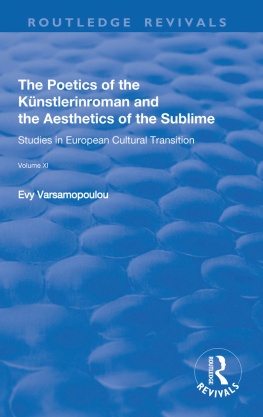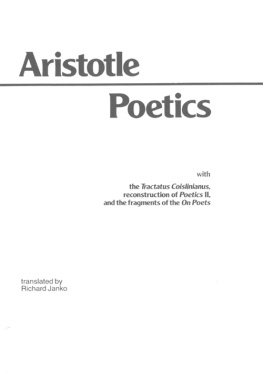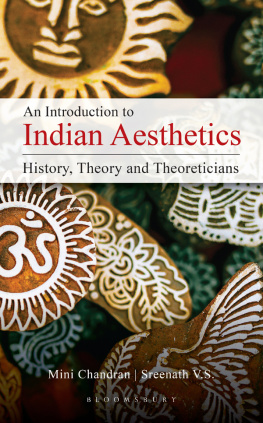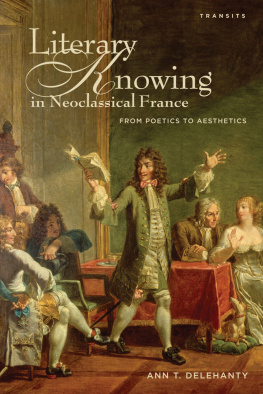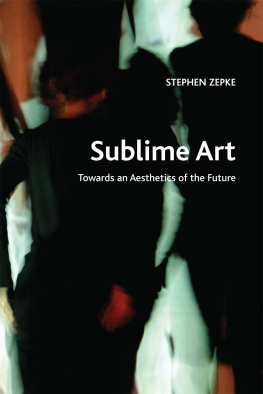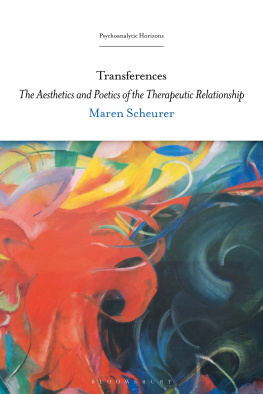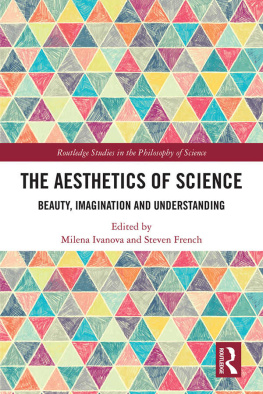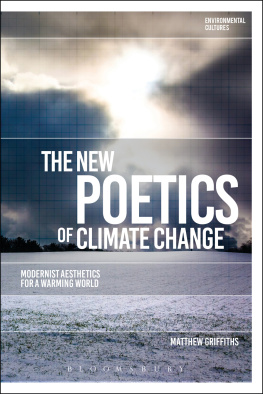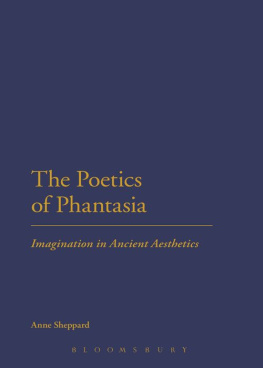The Poetics of the Knstlerinroman and the Aesthetics of the Sublime
The Poetics of the Knstlerinroman and the Aesthetics of the Sublime
Evy Varsamopoulou
Studies in European Cultural Transition
Volume XI
General Editors: Martin Stannard and Greg Walker
First published 2002 by Ashgate Publishing
Reissued 2018 by Routledge
2 Park Square, Milton Park, Abingdon, Oxon OX14 4RN
711 Third Avenue, New York, NY 10017, USA
Routledge is an imprint of the Taylor & Francis Group, an informa business
Copyright Evy Varsamopoulou, 2002
Evy Varsamopoulou has asserted her moral right under the Copyright, Designs and Patents Act, 1988, to be identified as the author of this work.
All rights reserved. No part of this book may be reprinted or reproduced or utilised in any form or by any electronic, mechanical, or other means, now known or hereafter invented, including photocopying and recording, or in any information storage or retrieval system, without permission in writing from the publishers.
Notice:
Product or corporate names may be trademarks or registered trademarks, and are used only for identification and explanation without intent to infringe.
Publisher's Note
The publisher has gone to great lengths to ensure the quality of this reprint but points out that some imperfections in the original copies may be apparent.
Disclaimer
The publisher has made every effort to trace copyright holders and welcomes correspondence from those they have been unable to contact.
Typeset by N2 productions
A Library of Congress record exists under LC control number: 2001022932
ISBN 13: 978-1-138-74135-5 (hbk)
ISBN 13: 978-1-315-18289-6 (ebk)
The European dimension of research in the humanities has come into sharp focus over recent years, producing scholarship which ranges across disciplines and national boundaries. Until now there has been no major channel for such work. This series aims to provide one, and to unite the fields of cultural studies and traditional scholarship. It will publish the most exciting new writing in areas such as European history and literature, art history, archaeology, language and translation studies, political, cultural and gay studies, music, psychology, sociology and philosophy. The emphasis will be explicitly European and interdisciplinary, concentrating attention on the relativity of cultural perspectives, with a particular interest in issues of cultural transition.
Martin Stannard
Greg Walker
University of Leicester
This book was originally written at the Centre for Critical and Cultural Theory of the University of Wales in Cardiff, where I was a doctoral student, and subsequently revised while working at Anglia Polytechnic University. The State Scholarship Foundation of Greece made it possible for me to spend the necessary years reading, writing and thinking about this project by approving my research proposal and by their generous financial support. The Centre for Critical and Cultural Theory offered a stimulating forum for discussion and debate of contemporary theory, literature and philosophy through its reading groups, its academic staff and post-graduate students. I am particularly indebted to my supervisor, Dr Jane Moore, who bore patiently with my early explorations and allowed me to develop freely the directions into which the literature took me. Professor Diane Elam and Dr Steven Vine were enthusiastic supporters and readers of some or all of this work and also helped by running reading groups and seminars for the discussion of Kant and other philosophers' work on aesthetics and the sublime. Professor Chris Norris generously helped by reading through the second chapter and advising me to expand on certain points. I would like to thank Professor Patricia Waugh for her constructive criticism of the book in its early form as a doctoral thesis and her support for its publication. The series editors, Professor Martin Stannard and Dr Greg Walker of the University of Leicester, have shown unflagging interest and patience during the three years it took for this manuscript to enter the world of published books. I am particularly grateful to Maria Varsamopoulou and Adam Woodruff, who read through the entire manuscript with care, and for their friendship, support and faith in my work that sustained me. This book is dedicated to my family who helped me live through and overcome the greatest difficulties in completing this book and for their unreserved faith, support, encouragement and spirit of endurance.
Introduction
The Genre of Genre Criticism of the Knstlerinroman
The underlying premise of this book is that the Knstlerinroman or (female) artist novel, is a genre that merits and demands a separate study of its own. The second premise is that studies that limit the range of artist novels studied reveal as much about the concerns and defining features of the genre without losing sight of the specificity of each novel. Therefore this study will not satisfy desires for encyclopaedic overviews, generalisations or over-arching comparisons. It is, in fact, a study of one kind or sub-category of Knstlerinroman : literary in focus and Romantic in mode. However, in order for such a study to be introduced, in the first place, the Knstlerinroman has to become recognizable as a genre. How can we recognize a genre? In terms of principles, genre theories range from the classical prescriptive notion of pure types to the Bakhtinian acceptance of the multiplicity of discourses defining the novel itself. My own position could be best described as siding with the Bakhtinian end of the spectrum. While I by no means consider it necessary to specify generic affiliations or theorize genre at every approach to a literary text, to systematically avoid the question of genre, when it may be especially significant for the historical, interpretive and theoretical reception of a particular work of literature, seems equally biased. To refuse to name or to describe a text's participation in a genre is to refuse to a certain degree our (scholarly) response to a text. It also serves to obscure the socio-historical network of literature, and even to render more difficult our understanding of the meanings of critical terms like Romanticism, modernism and postmodernism, by not approaching them through specific examples of literary (novelistic) production.
It should be possible to discover some features that all Knstlerinromane have in common with the earliest examples of the genre. Its differences from various other genres, as well as the generic influences intrinsic to the Knstler/ Knstlerinroman tradition, cannot be grasped without an (at least) rudimentary understanding of its genealogy from within an important event in European literary history: Early German Romanticism. For this reason, I find it worthwhile to reach back into literary history to the Knstlerroman or (male) artist novel
Knstlerroman is the name given to a kind of German novel which made its appearance in 1798 with Ludwig Tieck's Franz Sternbalds Wanderungen [Franz Sternbald's Wanderings ].
In a nutshell, we have the artist as an individual who resists being socialized as a 'useful' or 'productive' socio-economic contributor who merely 'fits into' his community; he seeks another world and finds it, not in religion, but in art, which he pursues with religious devotion. Hence the attraction to what is otherworldy: fairies, magic, infinity, spirituality, the sublime. In this 'otherworldy place' (of art) within the world, the Knstlerroman stages its social critique.


